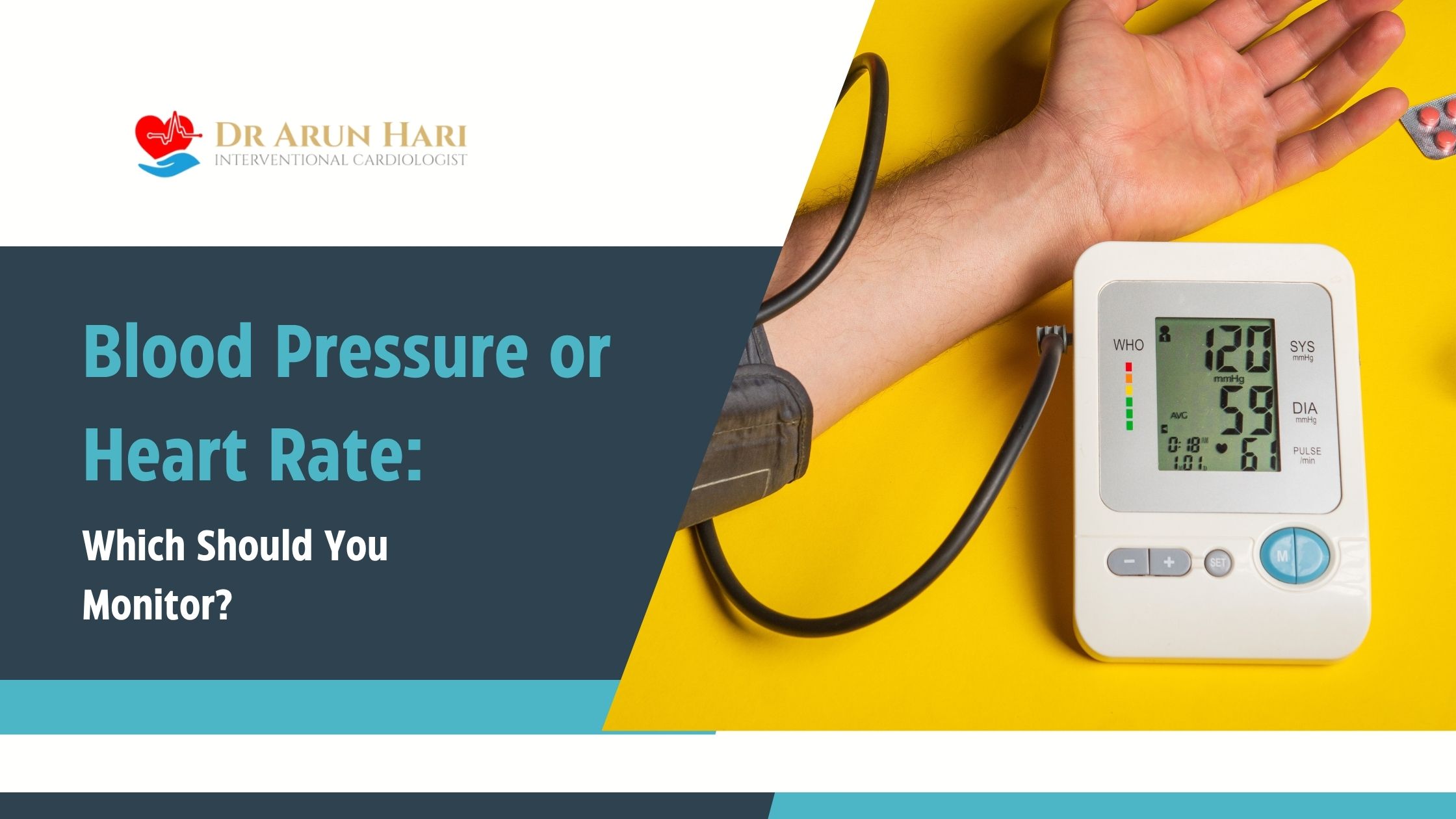Understanding The Basics: Blood Pressure Vs Pulse
Blood pressure vs pulse represents two different cardiovascular metrics. Blood pressure is the force of blood against arterial walls, measured as systolic and diastolic readings. Pulse, meanwhile, is the number of heartbeats per minute. Dr. Arun Hari explains that while both are essential, changes in either can signify very different health issues.How Do You Compare Heart Rate Vs Pulse Rate?
Technically, heart rate vs pulse rate should yield the same number in healthy individuals. However, discrepancies between the two may indicate poor perfusion or arrhythmias. Dr. Arun Hari uses advanced tools like ECGs and arterial monitors to distinguish and assess these values more accurately in his patients.What Does High BP And Low Heart Rate Indicate?
High BP and low heart rate is a combination often seen in patients on beta-blockers or with conduction system disease. This imbalance may suggest that the heart is under strain despite slower beats. Dr. Arun Hari considers such cases critically important and often investigates using Holter monitoring and exercise ECGs.Should You Worry About Slow Heart Rate With High Blood Pressure?
A slow heart rate with high blood pressure could imply that your body is compensating, possibly due to medication or a hidden cardiac issue. Dr. Arun Hari notes that such patients may be at risk of inadequate blood flow to vital organs, warranting comprehensive diagnostics to rule out bradycardia-related complications.What Does BP Vs Heart Rate Tell You?
Comparing BP vs heart rate offers a more nuanced picture of cardiovascular function. While blood pressure gauges vascular resistance, heart rate reflects cardiac workload. Dr. Arun Hari emphasizes the importance of tracking both over time, especially for patients with known coronary artery disease, to detect trends that precede acute events.Exploring The Pulse And BP Relationship
The pulse and BP relationship can highlight imbalances between cardiac output and systemic resistance. For example, an elevated pulse with stable BP may suggest anxiety or dehydration, while low pulse with high BP could reflect heart block or drug toxicity. Dr. Arun Hari’s expertise ensures such patterns are neither missed nor misinterpreted.Why High Blood Pressure Low Pulse Is A Red Flag
High blood pressure low pulse scenarios may be a red flag for serious conditions such as intracranial pressure elevation, heart block, or side effects from certain cardiac medications. Dr. Arun Hari advises patients not to ignore this combination and seeks immediate medical assessment when such readings appear frequently.Should You Monitor Blood Pressure Or Heart Rate Daily?
Dr. Arun Hari recommends regular monitoring of both. However, if you’re at risk of hypertension, prioritize blood pressure checks. For those prone to arrhythmias or with implanted cardiac devices, tracking heart rate is critical. His personalized treatment plans are built around individual risk factors and patient lifestyle.Integrated Cardiac Monitoring With Dr. Arun Hari
As an Interventional Cardiologist, Dr. Arun Hari has managed thousands of patients with fluctuating blood pressure or heart rate. He combines catheter-based diagnostics, ambulatory monitoring, and pharmacological adjustments to create a stable cardiovascular environment for long-term health.Dr. Arun Hari’s Perspective: Prevention Over Cure
Understanding the interaction of blood pressure vs pulse or BP vs heart rate isn’t just for those with heart conditions—it is essential for everyone. Dr. Arun Hari encourages annual screenings and digital tracking of both metrics to stay ahead of potential health problems.Book A Consultation With Dr. Arun Hari
If you’re unsure whether to focus on blood pressure or heart rate monitoring, speak directly with a cardiovascular expert:- Fill the form at https://drarunhari.com/book-appointment/
- Call or WhatsApp +971 544815774
- Use the website’s WhatsApp chat option to schedule instantly
Summarizing: Know What To Measure—And When
Don’t wait until symptoms worsen. Whether it’s high BP and low heart rate or a puzzling pulse and BP relationship, understanding your vitals could save your life. Dr. Arun Hari helps decode these numbers and put you back on the path to heart wellness. The best time to act is now.Frequently Asked Questions – Blood Pressure Or Heart Rate: Which Should You Monitor?
Q1: Why Is Monitoring Blood Pressure Or Heart Rate Important?
Tracking your blood pressure or heart rate is essential to detect early signs of cardiovascular risk. While blood pressure highlights the force of blood in your arteries, heart rate tells how frequently your heart is beating. Dr. Arun Hari uses both metrics to assess your cardiac function and tailor precise treatment plans.
Q2: What’s The Difference Between Blood Pressure Vs Pulse?
Blood pressure vs pulse represents two distinct cardiovascular readings. Blood pressure gauges arterial force, while pulse measures heartbeats per minute. They may rise independently or in tandem. Dr. Arun Hari evaluates both during diagnosis to understand your vascular and cardiac workload better.
Q3: How Do You Interpret Heart Rate Vs Pulse Rate?
In most cases, heart rate vs pulse rate should reflect the same value. However, differences between the two could indicate arrhythmias or poor circulation. With advanced diagnostics, Dr. Arun Hari helps detect and treat such anomalies early to avoid complications.
Q4: What Does High BP And Low Heart Rate Mean?
High BP and low heart rate may occur in people on beta-blockers or those with heart conduction issues. This unusual combination can be concerning if symptoms like fatigue or dizziness are present. Dr. Arun Hari closely monitors such patients and adjusts treatment to ensure safety and efficiency.
Q5: Is Slow Heart Rate With High Blood Pressure Dangerous?
Yes, a slow heart rate with high blood pressure can reduce the oxygen supply to vital organs, especially in elderly patients or those with underlying cardiac disease. Dr. Arun Hari employs tests like ECG and Holter monitoring to identify causes and prevent further cardiac compromise.
Q6: What Should I Know About BP Vs Heart Rate?
BP vs heart rate comparisons are helpful for understanding how your heart responds to stress, medication, or physical activity. While blood pressure reflects vascular resistance, heart rate shows cardiac output. Dr. Arun Hari uses these parameters to make timely and targeted clinical decisions.
Q7: Can You Explain The Pulse And BP Relationship?
The pulse and BP relationship gives insight into how well your heart is pumping and how elastic your arteries are. Abnormalities may indicate a need for lifestyle or medication adjustments. Dr. Arun Hari interprets these values together for a more comprehensive picture of cardiovascular health.
Q8: Is High Blood Pressure Low Pulse A Serious Issue?
High blood pressure low pulse can be a sign of bradycardia, medication side effects, or elevated intracranial pressure. This condition should not be ignored. Dr. Arun Hari provides in-depth evaluations to determine its cause and implement effective intervention strategies.
Q9: How Can I Schedule An Appointment With Dr. Arun Hari?
Booking a consultation is simple:
- Fill out the online form at https://drarunhari.com/book-appointment/
- Call or send a WhatsApp message to +971 544815774
- Use the WhatsApp interface on the website for fast scheduling
Dr. Arun Hari’s team will coordinate the appointment and guide you with the necessary steps for your cardiac assessment.





